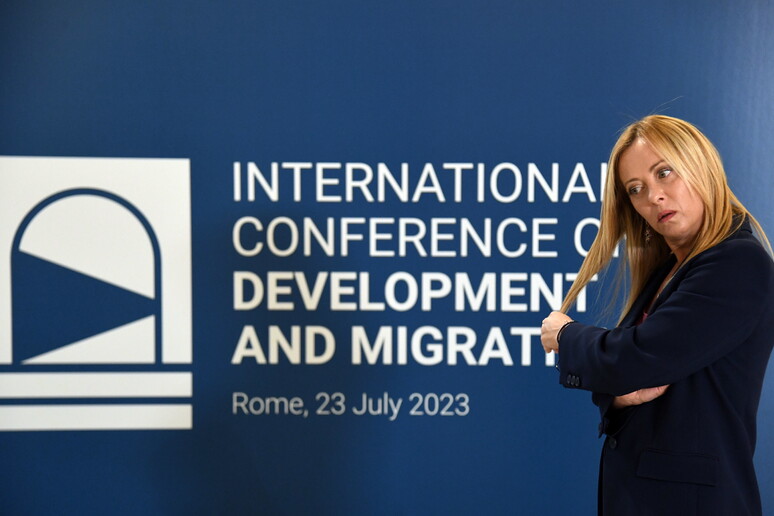Premier Giorgia Meloni on Sunday
launched a "dialogue of equals" between countries on both shores
of the Mediterranean and further afield in the attempt to find
solutions to irregular migration to Europe and promote
cooperation in the fields of agriculture, energy,
infrastructure, education and healthcare.
"Mass irregular migration harms everyone except criminal
organisations, which use their strength to play with the lives
of the most fragile people," said Meloni at the opening of the
international conference on migration and development in Rome,
calling for "joint efforts and more cooperation to fight the
network of traffickers".
Meloni said in order to tackle migration, partnerships with
countries of origin and transit "must be equal, non-predatory,
multidimensional and long-term".
They "must be based on respect and not on a paternalistic
approach, on solidarity, on respect for each other's
sovereignty, on shared responsibility for upholding legality,"
the premier added.
This, she insisted, "is the only serious way to strengthen our
bond, trust each other and foster the development and prosperity
of our peoples".
European Commission President Ursula Von der Leyen also insisted
on the need to "crack down on traffickers" and "destroy their
cynical business model".
"Opening up new legal routes between our continents can create a
real and safe alternative to dangerous journeys at sea," she
added.
"The EU is working to promote resettlement and humanitarian
admission. We must join forces to dismantle the cruel and
illegal business model of criminals and make people aware of the
lies that traffickers spread," she said.
In recent months Italy has been pushing to make the so-called
'external dimension' of migration - working with countries of
origin and transit and potential safe third countries to manage
flows of migrants and refugees before they arrive in the bloc -
a key element of European migration policy, as reflected in the
recent memorandum of understanding between the EU and Tunisia
ensuring "an integrated approach to the migration crisis"
covering macro-economic stability, trade and investment, green
energy transition, people-to people contacts, and migration.
This, said Von der Leyen on Sunday, is "a model, a project for
the future, for partnerships with other countries in the
region".
"We want to adopt a pragmatic approach based on shared interests
and common values. We want to find solutions tailored to local
realities," she added.
Tunisian President Kais Saied was among the leaders present at
the conference in Rome, organised in haste on the initiative of
Meloni after her visit to Tunis with Van del Leyen and Dutch
Premier Mark Rutte last Sunday to sign off on the deal.
In all, the conference brought together five heads of state
(Tunisia, United Arab Emirates, Mauritania, Libya, Cyprus),
eight prime ministers (Libya, Ethiopia, Egypt, Malta, Jordan,
Nigeria, Algeria, Lebanon) and eight ministers (Saudi Arabia,
Morocco, Oman, Kuwait, Turkey, Greece, Qatar, Bahrain), as well
as the heads of European institutions, international financial
organisations and several United Nations agencies.
Italy has been struggling to cope with a massive uptick in the
number of arrivals of migrants and refugees by sea in search of
safety and a better life in Europe.
As of July 21, 83.439 people had arrived in Italy by sea since
the start of the year, compared to 33,972 in the same period in
2022 and 25,149 in 2021, while nearly 1,100 people have died or
have gone missing during the sea crossing.
On Sunday Deputy Premier and Foreign Minister Antonio Tajani
said the Mediterranean should be a "sea of peace and progress",
rather than a cemetery.
"Rome has always been, and wants to be, a crossroads between
peoples who want to build a new season together," said Tajani at
the opening of the conference.
"We do not want the Mediterranean to be a cemetery of people
leaving their homes; instead, we want the Mediterranean
extending as far as the Indo-Pacific region to be a sea of peace
and progress," he added.
Migration, the foreign minister said, is not the only "big
problem we are facing". "We have to solve the migration issue at
its root, we have to deal with the big question of climate
change, the fight against terrorism, disease, because often the
major traffickers of human beings are the same people that
traffic in arms and drugs," said Tajani.
Meanwhile, in his Sunday Angelus prayer and blessing from the
Apostolic palace overlooking St Peter's Square Pope Francis
called on "the European and African heads of state and
government to urgently provide aid and assistance" to "migrants
in the northern part of Africa".
"Thousands of them have been trapped and abandoned in desert
areas for weeks amid unspeakable suffering," said the pope.
"May the Mediterranean never again be a theatre of death and
inhumanity.
"May the Lord enlighten the minds and hearts of all, arousing
feelings of fraternity, solidarity and welcome," he added.
ALL RIGHTS RESERVED © Copyright ANSA











